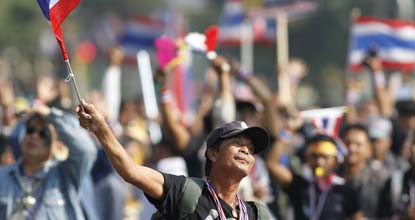
The path to the Feb 2 general election is not yet clear despite 34 political parties reporting to the Election Commission (EC) on the first day of candidacy registration.

Penphan Laemluang, a reporter from state-owned Channel 9, who was attacked by a group of anti-government protesters on Sunday. Here, she and her cameraman are locked inside the compound of the Thai-Japanese Stadium in the Din Daeng area, the election candidacy registration venue, yesterday. PATTANAPONG HIRUNARD
The first day of party-list candidate registration was thrown into disarray after several hundred anti-government demonstrators surrounded the Thai-Japanese Stadium, the candidate registration venue.
Even though representatives from nine political parties including the Pheu Thai Party were able to get inside the stadium, representatives from 25 other parties which were not able to get in went to file complaints at the Din Daeng police station and the Crime Suppression Division.
They also reported to EC officers at Din Daeng station since they were unable to submit their documents.
The parties included Pheu Thai, Chart Pattana, Rak Santi, and Chartthaipattana.
All the 34 parties will join a draw for ballot sheet numbers to be scheduled later. Any change of venue will first be announced in the Royal Gazette.
"We will see when the time comes. They may have to get in by abseiling," joked EC commissioner Somchai Srisutthiyakorn.
"We have until Friday. Every party has to register. If they can't the EC will see what it can do," said Mr Somchai.
But more hurdles still lie ahead as the protesters are set to block the parties from taking part in the draw.
More chaotic scenes can be expected when registration for constituency candidates is held between Saturday and next Wednesday in 77 provinces nationwide. The South could experience particularly bad disruption as it is the support base of the Democrat Party and most voters there have made it clear they will boycott the election.
Anti-government protest leader Suthep Thaugsuban called on protesters last night to protest at each location where the election process takes place. He also said the protest would target caretaker Prime Minister Yingluck Shinawatra more closely with actions similar to that at her house on Sunday.
However, the EC must try as hard as it can to ensure the registration process goes ahead as planned.
The constitution stipulates the House of Representatives can convene its first meeting only after the EC endorses at least 95% or 456 of all 480 MPs within 30 days of election day.
That means those who boycott the poll must do everything they can to disrupt the election of at least 25 MPs to prevent the success of the election and the opening of the House.
In light of this, supporters of the Democrat Party in the South are likely to come out to disrupt the election of the MPs, given that the Democrat Party won up to 50 seats in its stronghold in the 2011 general election.
Parnthep Pourpongpan, spokesman of the People's Alliance for Democracy, also believes that the candidacy registration and the Feb 2 election cannot proceed.
He believes the registration of the list-MP candidates yesterday was not complete without the ballot sheet draw and there is no guarantee the draw will not be disrupted again.
Mr Parnthep said it will be difficult for the EC to endorse 95% of the poll results as the Democrats and the People's Democratic Reform Committee (PDRC) will see to it that at least 25 poll candidates will not be elected.
"The government must consider the negative consequences as such scenarios will likely happen," he said.
Still more obstacles could block the path to elections.
By law each constituency which has only one candidate fielded needs at least 20% of its eligible voters to cast their ballots to make the election legitimate.
Since the Democrats are boycotting the election, it is possible there will not be candidates from other parties to be fielded in some Democrat strongholds due to pressure from Democrat supporters.
There are various tactics to disrupt the election, particularly the protests led by former veteran politicians like Mr Suthep, secretary-general of the PDRC.
He told the protesters that "since most people do not want the election, what can [the EC] do if local election committee members take the ballot boxes from voting venues and throw them in the river"?
After all, the anti-graft movement may be the most crucial factor that could disrupt the new government and the House after the election, if it happens.
The National Anti-Corruption Commission (NACC)'s investigation into the government's rice-pledging scheme will also deal a blow to the caretaker government.
An NACC inquiry committee said it expected to conclude the case after the New Year and this would adversely affect the government.
The NACC is also investigating impeachment and criminal cases against 383 former MPs and senators, who voted to pass the charter amendment draft on the composition of the Senate, which the Constitution Court ruled on Nov 20 was unlawful. Ms Yingluck was among the legislators who voted to pass the third reading of the draft.
Video by Thiti Wannamontha